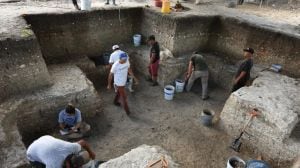J&K polls unlikely in near future, claims of ‘development priority’ find few takers
A senior BJP leader attributes 'growing disillusionment' among J&K people to 'disconnect' between them and local administration
 Voters stand in queue to cast their votes for the District Development Council elections, at a polling station in Kapran area of Anantnag district of south Kashmir in 2020. (Express file photo by Shuaib Masoodi)
Voters stand in queue to cast their votes for the District Development Council elections, at a polling station in Kapran area of Anantnag district of south Kashmir in 2020. (Express file photo by Shuaib Masoodi) The long-pending Jammu and Kashmir Assembly elections may not be in the offing as there is a thinking within the BJP-led Centre about the need for first turning around the situation in the Union Territory from its erstwhile phase of “non-development”.
Asked about the J&K polls, a senior Union government functionary told The Indian Express that “obviously somebody would take a call’’ on the issue. “You need to transform from a period where you needed to deal with the problems of lack of development or confined development,” he said.
In a reference to the period prior to August 5, 2019 — when the Centre scrapped Article 370 and split the J&K state into two UTs — the official said, “So the removal of Articles 370 and 35A was one process… Then you needed to bring in development and now you see that development,’’ adding that “then you have to make sure that development itself involves the democratic process’’.
He said early J&K polls would mean putting on “reverse gear’’ the UT’s ongoing development works worth hundreds of thousands of crores, which will be visible to the people, he added, in the next few months.“One must appreciate that when development takes places at a faster pace, the appetite of the people for more also increases,’’ he said.
J&K had come under the Governor’s rule on June 19, 2018 — for the fourth time since 2008 and eighth time since 1977 — after the BJP had walked out of its coalition government led by chief minister Mehbooba Mufti, the PDP president, saying that its continuance had become “untenable” for the party.
However, there are many even within the BJP who do not agree with the claim that the Assembly elections now would derail the development process. A senior BJP leader said the government wants to be “a little more confident” about winning the people over as it does not want them to gravitate towards “anti-national elements”. He saw the “nearest possibility” of the Assembly elections to be held after the Lok Sabha polls, which are slated for April-May next year.
The BJP leader attributed the “growing disillusionment” among people of the UT to the “disconnect” between them and the local administration. “To fix this, the government needs to appoint such politicians as advisors to the L-G, who have their support base among locals and understand their aspirations and problems well,” he said.
Questioning the government’s development claims, he asked, “What has been the development on the ground. Just opening IITs and IIMs is not development as these were projects of previous governments,” adding that even the beautification of the Tawi river front project was an old project. “You have only allotted land to outsiders,’’ he said in a reference to the allotment of land to real estate developers from different parts of the country and abroad.
Sources in the Election Commission (EC) admitted that the projection for the J&K Assembly poll schedule cannot be done well in advance, unlike the upcoming Panchayat and the Lok Sabha polls.
Referring to a series of major events lined up in the coming months, Anil Sharma, the president of the All J&K Panchayat Conference — which claims to represent over 33,000 elected panches and sarpanches across the UT — said there seemed to be little time left with the EC for holding the Assembly polls during the current financial year.
Sharma pointed out that the 62-day-long Amarnath yatra will kick off from Pahalgam and Baltal on July 1 and conclude on August 31 and that it will involve various government departments, police and security agencies for its smooth conduct as the yatra has always been on terrorists’ radar since mid-1990s.
The yatra’s conclusion is likely to be followed by elections to the urban and rural local bodies, whose five-year terms will expire in the coming months. It would clear the decks for the Lok Saha polls while barely leaving any time for conducting the Assembly elections, Sharma said.
Several mainstream parties have also demanded a rollback of the “anti-people’’ laws introduced by the J&K dispensation.
National Conference leader Rattan Lal Gupta says, “If voted to power, we will roll back all the anti-people laws brought in by the BJP government in J&K’’. “We will protect local people’s right to land, jobs and education,’’ he says, charging “They are bringing in people from outside, while our educated youth are sitting unemployed; they are giving land to outsiders after evicting local people from it.”
Gupta says the BJP has “realised” that the situation on the ground is not “conducive” for it to face the Assembly polls now. “What has the BJP dispensation done in J&K when there are thousands and thousands posts lying vacant,” he says, adding that at least 165 primary health centres in remote areas are without doctors and are being run by the para medical staff.
The NC leader also expresses concern over the decision to conduct admissions to colleges affiliated to the J&K universities through the CUET, charging that the government wanted the J&K children to go to Himachal Pradesh, Punjab and Haryana without considering its logistics.
The J&K Congress’s chief spokesperson Ravinder Sharma alleged that the Centre was delaying the Assembly elections as they know the BJP will “lose” it. “And after losing it what will they tell the people elsewhere in the country – that the J&K people are not happy with the abrogation of Article 370,’’ he said.
The saffron party can however remain “comfortable” by holding elections to urban and rural local bodies including Block Development Councils and District Development Councils, he said, charging that “they can manage them by using local BDOs”.
The Congress spokesman also raked up the issues like allotment of land to “outsiders” as well as the admission in undergraduate courses through the CUET to hit out at the BJP.
The Democratic Progressive Azad Party (DPAP)’s general secretary and ex-minister R S Chib also attributed the delay in the conduct of the Assembly polls to the BJP’s “rapidly falling graph among people”. “When they (BJP) can hold urban and local body polls then what is restraining them from holding Assembly elections,” he asked, adding “they know they cannot form government on their own”.
The J&K Apni Party’s provincial president and ex-minister, Manjit Singh, said the BJP was perhaps not feeling “politically comfortable” as its “much- hyped pitch about generation of large-scale employment after abrogation of Article 370 did not happen on the ground”.
The saffron party’s problems in J&K have increased in the wake of the demolition drive, imposition of property tax, increasing unemployment and non-regularisation of daily wagers, Singh said. Besides, bureaucrats from outside J&K have been given “plum postings”, which has caused resentment among local officials, he said, adding there was a “disconnect between the administration and common public”.
Singh also asked, “When everything is alright and J&K is witnessing unprecedented tourist rush and even a G-20 event has also taken place, then what is holding them (Centre) back from conducting Assembly polls?”



- 01
- 02
- 03
- 04
- 05




























